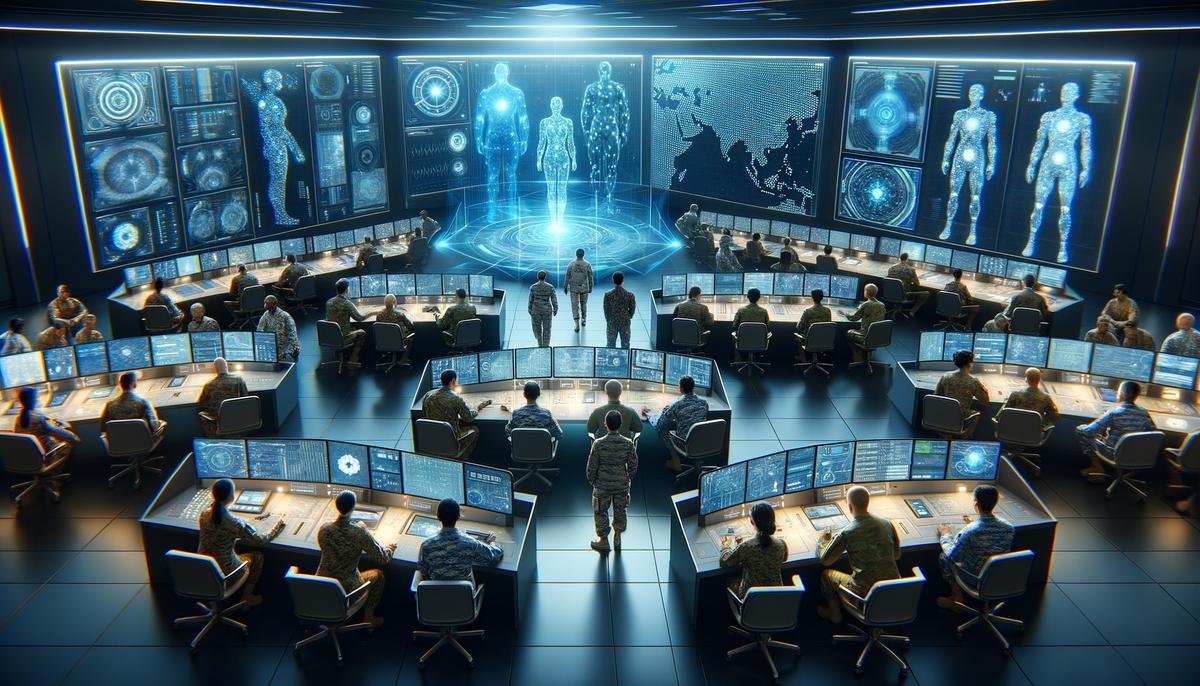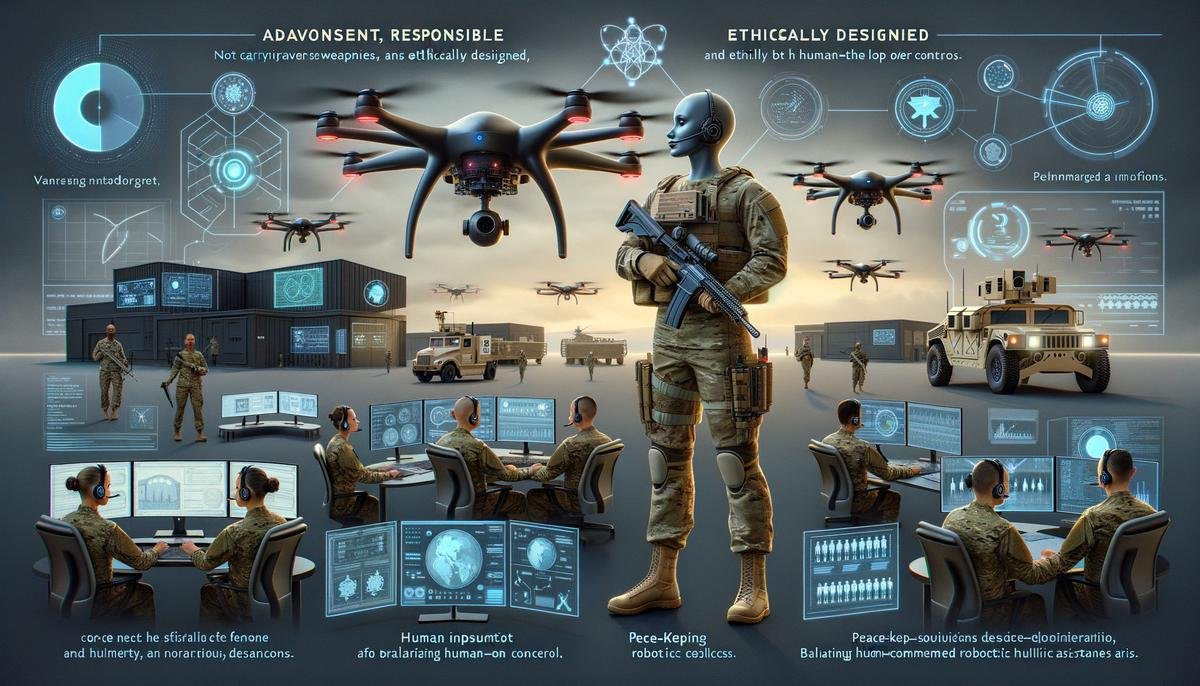The integration of Artificial Intelligence (AI) into military defense mechanisms represents a significant shift in how nations prepare for and engage in modern warfare. This advancement, spearheaded by entities like Lockheed Martin, brings forth a blend of opportunities and ethical considerations that must be addressed with precision and care.
AI Integration
Lockheed Martin integrates AI into military applications, notably the Aegis Combat System, which has evolved over 50 years. AI innovations enhance operational effectiveness, providing the U.S. Navy with a significant advantage.
The Aegis Combat System leverages AI to handle immense data volumes, facilitate decision-making, and improve response times. AI engineers at Lockheed Martin rapidly bring solutions from concept to real-world deployment.
AI's role extends across the Aegis ecosystem, from identifying patterns in radar data to optimizing maintenance schedules. Algorithms aid in processing complex data, enabling the detection of subtler threat signatures.
Integration involves rigorous testing and validation phases where AI algorithms are scrutinized for safety, efficacy, and alignment with ethical principles. Lockheed Martin adheres to the Department of Defense's AI Ethical Principles.
AI applications also include 3D printing technologies for on-the-fly manufacturing of parts with AI-assisted quality checks. This streamlines supply chains and enhances mission readiness.
Predictive maintenance is another area where AI shines, foreseeing equipment failures to minimize downtime and maintain operational readiness.
Lockheed Martin's AI integration revolutionizes military capabilities while setting a benchmark in ethical AI deployment. This empowers the U.S. Navy to face modern threats with advanced technological backing, ensuring maritime superiority.

Ethical Considerations
Navigating the ethical landscape of AI in military applications poses unique challenges, particularly when it comes to autonomous decision-making in combat. The core issue revolves around delegating life-and-death decisions to machines. Lockheed Martin is committed to aligning AI in defense with efficiency and fundamental human values.
A pivotal concern is the proper identification of combatants versus non-combatants to prevent unintended casualties. The accuracy of data and algorithms' ability to interpret complex scenarios ethically is crucial.
There's also the question of accountability for actions taken by AI systems in combat situations. Determining responsibility, especially in cases of errors or malfunctions, is complex. Lockheed Martin emphasizes AI's development alongside guidelines set by the Department of Defense, ensuring transparency.
The risk of potential misuse of military AI systems raises stringent security concerns. Rigorous control measures and international cooperation on AI arms control are necessary.
Lockheed Martin invests in training programs for AI algorithms, prioritizing ethical considerations from design to deployment. This includes simulating combat scenarios to ensure AI systems make decisions that align with international standards of conduct in warfare.
The integration of AI into military operations also raises the question of the impact on military personnel. AI should be viewed as a tool to assist rather than replace personnel, enhancing their capabilities and safety.
Ethical deployment strategies encompass ensuring AI systems do not escalate conflicts unnecessarily. Programming restraint into AI systems gives them the capability to propose more peaceful alternatives when available.
Every step of AI development and application in military contexts bears significant ethical questions that need careful consideration. Lockheed Martin's adherence to DoD ethical principles signifies an understanding that technology alone doesn't guarantee progress; it's the principled application of these tools that secures a safer world.

AI Challenges
As Lockheed Martin forges ahead, embedding AI into the U.S. Navy's arsenal, a slew of inheritance and compatibility issues with pre-existing systems emerge. Retrofitting advanced AI technologies into legacy platforms requires bridging old and new, ensuring seamless operation without jeopardizing mission-critical activities. Older military infrastructures may not have the flexibility or processing capability to support modern AI algorithms.
Cybersecurity in AI deployment within defense systems is fraught with unprecedented threats. AI's data-centric nature makes it a target for adversaries attempting to manipulate or disrupt military operations. Fortified cybersecurity measures and resilient AI algorithms are paramount to safeguarding national security interests.
Integration challenges arise as AI-driven technologies must coexist and operate with the broader tapestry of military assets. Cross-platform compatibility testing, engineering adjustments, and overhauls of operational doctrines are necessary to accommodate AI behavior in real-world missions.
Lockheed Martin navigates an ethical labyrinth in rolling out AI across military operations. Programming AI to make decisions in morally complex scenarios, traditionally the purview of human judgment, presents a profound challenge. Engineers and ethicists strive to encode a semblance of 'right and wrong' into systems potentially tasked with making autonomous life-and-death decisions.
Lockheed Martin grapples with the societal implications of AI militarization. The future role of human soldiers in an increasingly automated battlefield, potentially altering the identity of military service, must be examined. AI should augment human capabilities rather than replace them.
Concerns over AI's dual-use potential exist, as capabilities developed for defense could be misappropriated. Steadfast commitment to international norms and engagement with global partners is imperative. As AI reshapes the nature of conflict, proactive dialogue and cooperation are vital to ensure these technologies serve to enhance peace and security on the global stage.

Future of AI in Defense
The integration of artificial intelligence into military defense applications reveals a dynamic field set to transform modern warfare. Advancements spearheaded by companies like Lockheed Martin focus on harnessing AI's potential to redefine strategic operations. Predictive maintenance, enhanced situational awareness, and the deployment of autonomous vehicles stand out, pointing to a future where AI's role in military defense expands exponentially.
Predictive maintenance represents a promising application of AI in a military context. AI algorithms analyze patterns in equipment performance data, anticipate potential failures, and recommend preemptive actions. This capability reduces downtime and extends the lifespan of critical defense assets.
AI's ability to sort through vast amounts of data from different sources in real-time has transformative implications for situational awareness in defense operations1. AI assists in collating data from satellites, ground sensors, and other intelligence-gathering resources, synthesizing it into actionable insights. Military commanders can now rely on AI-driven insights for faster and more informed responses to evolving tactical situations.
Autonomous vehicle technology, from drones conducting surveillance to unmanned vehicles navigating treacherous terrains, marks another revolution. These technologies offer the prospect of executing high-risk operations with minimized human exposure to danger.
Autonomous logistics and supply chain capabilities revolutionize how armed forces resupply units during ongoing operations. AI optimizes routing based on changing conditions, threats, and urgencies, ensuring efficient supply delivery. This vastly improves operational readiness and sustains momentum in prolonged engagements.
The evolution of drone swarms utilizing collective AI captures the imagination. These swarm technologies coordinate large numbers of drones to perform concerted tasks, showcasing a leap in strategic capabilities. Their autonomous nature enables rapid adaptation to combat scenarios, embodying a blend of speed, precision, and decision-making prowess that magnifies military effectiveness.
As AI continues to make inroads into various aspects of military defense, its ethical implications grow increasingly significant. Embedding ethical considerations into AI systems becomes paramount, ensuring these technologies serve to protect and preserve life while adhering to international law and standards2.
The relentless pace at which AI transforms military defense points toward a future less reliant on human soldiers being placed in harm's way. AI-driven systems promise enhanced efficacy, reduced casualties, and a moral approach that places a premium on safeguarding lives.
By tapping into AI's vast capabilities, military defense is witnessing an era of unprecedented technological empowerment while confronting the necessity of steering this power toward humanitarian ends. As researchers, developers, and strategists explore the bounds of AI in defense, the collective endeavor will reshape our understanding of warfare, ushering in an era where smart, ethical AI applications form the cornerstone of defense strategies globally.

In conclusion, the journey of integrating AI into military defense mechanisms is marked by a careful balance between technological innovation and ethical responsibility. Lockheed Martin’s commitment to developing AI applications that are as responsible as they are revolutionary sets a precedent for how future advancements should be approached. This focus ensures that the primary goal remains clear: leveraging AI’s vast capabilities to safeguard lives and maintain peace, thereby redefining the landscape of global security through smart, ethical applications of technology.
- Shahbaz A, Jadoon A, Rana T, Khan I, Mallick MK. Artificial intelligence-based combat command system for military decision making in multidomain operations. Scientific Programming. 2021;2021:1-12. doi:10.1155/2021/2513460
- Gupta AK. Ethical and legal challenges of artificial intelligence in military domain: an Indian perspective. Journal of Military Ethics. 2021;20(1-2):39-60. doi:10.1080/15027570.2021.1963962




